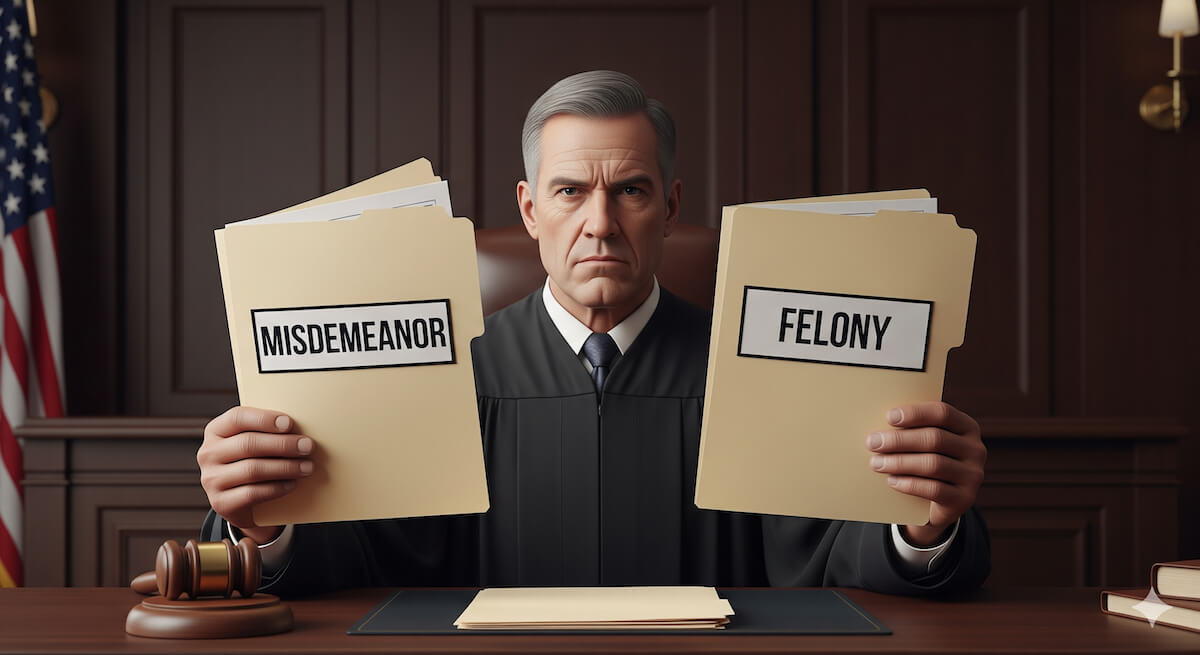In the United States, criminal offenses are typically divided into two primary categories: misdemeanors and felonies. This classification determines how the legal system will handle the case, the severity of punishment, and the lasting consequences on the accused's life. Understanding these differences is critical—whether you’re directly involved in a criminal case or supporting someone who is.
For real-world context, read criminal defense case study or explore their guide to criminal defense fee structures.
What Is a Misdemeanor?
A misdemeanor is a criminal offense considered less severe than a felony, but more serious than an infraction (such as a traffic ticket). While misdemeanor charges often don’t result in prison time, they still carry legal, financial, and personal consequences.
Common Examples of Misdemeanors:
- Petty theft (stealing items under a certain value)
- Disorderly conduct
- Public intoxication
- Simple assault (where no serious bodily harm occurs)
- First-time DUI
- Trespassing
- Vandalism
Penalties for Misdemeanors:
- Jail time: Up to 12 months in a local or county jail
- Fines: Often ranging from a few hundred to several thousand dollars
- Probation: May be required in lieu of or in addition to jail time
- Community service or mandatory education programs
- Criminal record: Misdemeanors show up on background checks
Although a misdemeanor doesn’t carry the social and legal weight of a felony, it can still affect employment, housing opportunities, and professional licensing.
For an overview of how misdemeanor cases are prosecuted, check the U.S. Courts page on criminal cases.
What Is a Felony?
A felony is the most serious classification of crime in the U.S. Felonies typically involve violence, large-scale property damage, drug distribution, or crimes against the state. These offenses can result in long prison sentences, steep fines, and a wide range of long-term consequences.
Common Examples of Felonies:
- Murder or manslaughter
- Sexual assault or rape
- Kidnapping
- Aggravated assault with a deadly weapon
- Grand theft or burglary
- Drug trafficking or manufacturing
- White-collar crimes like large-scale fraud or embezzlement
Penalties for Felonies:
- Incarceration: More than one year in state or federal prison
- Fines: Often tens or hundreds of thousands of dollars
- Probation or parole after release
- Loss of civil rights: Voting rights, firearm ownership, and eligibility for certain licenses or jobs
Felonies carry a lifelong stigma. Even after serving your sentence, a felony conviction can significantly limit your freedom, reputation, and ability to rebuild your life.
For stats on common felony offenses and sentencing data, visit the Federal Bureau of Prisons website.
Key Differences: Misdemeanors vs. Felonies
The main differences between misdemeanors and felonies center around:
- Severity of the Crime
- Felonies involve serious harm to people, property, or the public. Misdemeanors are less severe but still represent violations of law and public order.
- Length and Type of Incarceration
- Misdemeanor: Jail time under one year, served in local jails.
- Felony: Prison time over one year, served in state or federal prisons.
- Impact on Civil Rights
- Felonies may result in loss of rights (e.g., voting, owning firearms).
- Misdemeanors usually do not carry civil penalties but can still affect background checks.
- Legal Procedures
- Felony cases generally involve more complex procedures, including grand jury indictments, formal arraignments, and longer trials. Misdemeanors often move more quickly through the court system.
Learn how lawyers prepare for these cases in article on criminal case preparation.
Long-Term Consequences
Both misdemeanors and felonies can affect your life beyond the courtroom.
Misdemeanor Consequences:
- May disqualify you from certain jobs or rental housing
- Can affect immigration status (e.g., green card or visa applications)
- Remains on your criminal record unless expunged
Felony Consequences:
- Loss of rights: Voting, firearm ownership, eligibility for public office
- Ineligibility for professional licenses in medicine, law, education, etc.
- May result in deportation or denial of citizenship
- Barriers to employment, especially in government or finance
- Social stigma that may last a lifetime
The National Institute of Justice provides in-depth research on the broader impacts of criminal records on communities.
Can You Clear Your Record?
Expungement or Record Sealing:
In many states, individuals convicted of certain misdemeanors—and even some non-violent felonies—can apply to have their criminal records sealed or expunged.
- Expungement means the record is destroyed or erased.
- Sealing means the record still exists but is hidden from the public.
This process can improve your chances of:
- Finding a job
- Getting approved for housing
- Restoring your reputation
For the process and eligibility details, see guide to expungement.
When to Hire a Criminal Defense Lawyer
Regardless of whether you’re facing a misdemeanor or a felony, having a qualified criminal defense attorney can dramatically improve your outcome.
A good lawyer can:
- Negotiate reduced charges or alternative sentencing
- Challenge evidence or procedural errors
- Help you avoid jail time
- Represent you in court and protect your rights
Not sure how much a lawyer will cost? Review guide to criminal defense fees.
Final Takeaways
- Misdemeanors are less severe, but still carry jail time, fines, and criminal records.
- Felonies are serious offenses that often involve lengthy prison sentences and lifelong consequences.
- The impact of a criminal conviction can last long after your sentence ends—affecting housing, employment, civil rights, and reputation.
- Legal representation is critical—don’t go through the criminal justice system alone.
If you or a loved one is facing a criminal charge, consult an experienced defense attorney immediately to understand your options and build a strong defense strategy.
